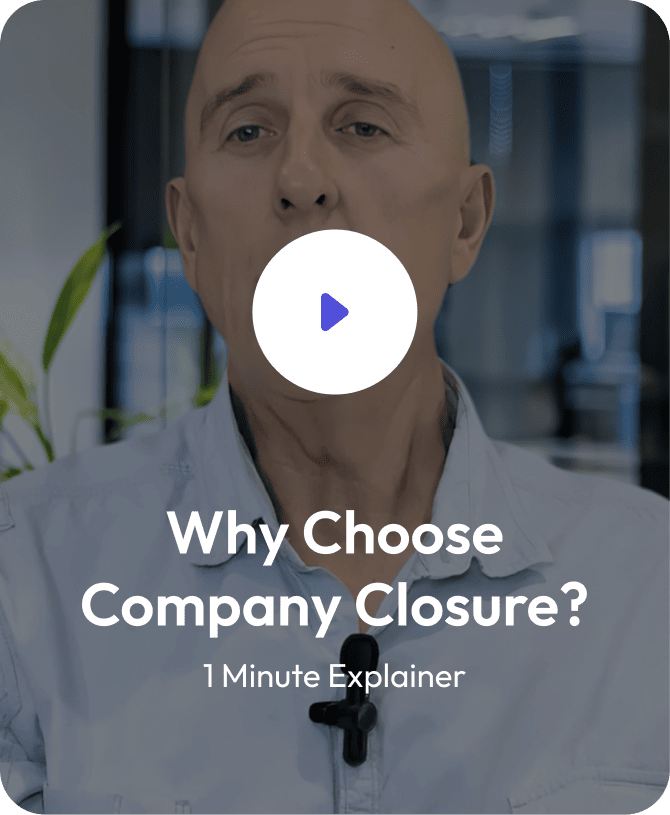Can I close an insolvent company?
It is possible to close an insolvent limited company. This is done by way of a formal insolvency procedure known as a Creditors’ Voluntary Liquidation (CVL). In order to place an insolvent company into CVL, a licensed insolvency practitioner must be appointed to facilitate the process.
Your appointed insolvency practitioner will oversee the whole closure process, including dealing with creditors and liquidating company assets. Once all assets have been dealt with and available funds distributed to creditors, the company can then be closed at Companies House which will complete the liquidation process. At this point the insolvent company will be officially closed and will no longer legally exist.
Can I strike off an insolvent company?
Strike off is designed as an easy and straightforward way to close a solvent company; despite this, some directors will attempt to dissolve their insolvent company using this method. Most strike off applications made by insolvent companies will be suspended when a creditor becomes aware of their plan and lodges an objection with Companies House to halt the process.
If an insolvent company is dissolved using the strike off process, there is always the risk that a creditor could come back at a later date and apply to have the company restored to the register so that outstanding debts can be chased. If you are in any way unsure as to whether you should close your insolvent company through liquidation or by applying for strike off, consult a licensed insolvency practitioner for further guidance before going any further along the closure process.
What happens to debts when an insolvent company is closed via liquidation?
As part of the CVL process, the insolvency practitioner will work to identify all assets belonging to the insolvent company, before having these valued and sold. Proceeds will be used to pay off outstanding creditors of the company as far as possible according to a payment hierarchy as set out in the Insolvency Act 1986.
Due to the nature of the company being insolvent, however, there will be a shortfall between the money raised through liquidating company assets and the total amount which is ultimately owed by the company. This shortfall will be written off when the liquidation is complete and the company officially closed at Companies House.
The exception to this is any debts which have been secured by a personal guarantee. Any borrowing which has been personally guaranteed will remain active after the closure of the business and the responsibility for paying the remaining amount will fall to the individual who provided the guarantee.
Can directors be held liable for debts after closure of an insolvent company?
Personal liability for company debts can happen, however, if severe director misconduct or wrongful trading can be proven. When an insolvent company is closed via liquidation, an investigation will be conducted into the actions of its directors leading up to the company becoming insolvent. If directors can be seen to be directly responsible for the company’s insolvency, they may be held personally liable for some or all of the company’s debt. This, however, is extremely rare and most insolvent company closure cases end with no ongoing director liability.
Understanding director duties when a company is insolvent
While many companies will find themselves insolvent at some point, this does not mean the situation should not be taken seriously. Once a company is knowingly insolvent, its directors have a number of legal responsibilities which they must adhere to. One of these is to act in the best interests of creditors, rather than the interests of the company and its shareholders.
It is therefore not an option for a company to continue trading on when you know the company is insolvent. Continuing to increase liabilities or decrease assets is a breach of your duties as the director of a limited company, and you could face serious repercussions if action is not taken to manage the situation.
Taking the advice of a licensed insolvency practitioner at the first signs of insolvency demonstrates your desire to priorities the interests of creditors and adhere to your legal obligations in this matter.
Need to speak to someone?
With multiple offices across the UK and a vastly experienced team of business closure experts, you are never far away from the advice you need. Our Licensed insolvency practitioners provide free consultations to all directors and shareholders, and can quickly ascertain which closure method is best for your business.
We are licensed by recognised professional bodies and have helped thousands of directors over many years. Contact us today for your free company closure consultation.
Related Posts
25,000+ Company Directors Supported – Partner Led Service
At Company Closure we have a nationwide team of licensed insolvency practitioners and company closure experts here to help you understand your options. Whether your company is solvent or insolvent, there is a closure method out there to suit you.
Call our team of licensed insolvency practitioners today:




